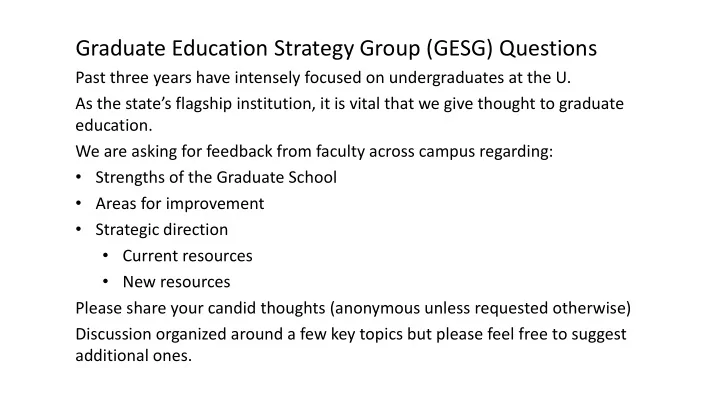

Graduate Education Strategy Group (GESG) Questions Past three years have intensely focused on undergraduates at the U. As the state’s flagship institution, it is vital that we give thought to graduate education. We are asking for feedback from faculty across campus regarding: • Strengths of the Graduate School • Areas for improvement • Strategic direction • Current resources • New resources Please share your candid thoughts (anonymous unless requested otherwise) Discussion organized around a few key topics but please feel free to suggest additional ones.
1. NUMBER OF STUDENTS TRAINED AND HOW THEY ARE SUPPORTED vis PLACEMENT Opportunities a. Is the stipend your program offers competitive regionally and nationally? b. Should per-student stipend support be increased to increase quality of applicants even if this change decreases the number of assistantships? c. How do considerations about the number of students we are training reflect post- graduate placement opportunities? d. Are there shifts, for better or for worse, in post-graduate placement opportunities that we should be taking into account in the number of students we train and in the kinds of professional development activities the graduate school supports? e. What should the graduate school be doing to offer professional development training to support graduate students and to improve their career prospects? (e.g., writing support, as well as such broader skills as academic integrity, public speaking, networking, time management, career planning, and leadership)
2. OTHER KINDS OF SUPPORTS FOR GRADUATE STUDENTS – FELLOWSHIPS, RESEARCH, TRAVEL a. Strengthen the fellowship office to facilitate student applications to many existing programs (e.g., NSF-GRFP, NSF-NRT, Fulbright, Hertz, Boren, Gates, etc.). b. Development of summer term mid-candidacy fellowships for excellence in research. c. Discuss graduate school travel funding, its amount, and its implementation – Are changes needed to the timing of distributions? Has funding been adequate to support your students’ travel? d. How are students who participate in interdisciplinary training programs supported? Are improvements needed?
3. EVALUATION OF SERVICES SUPPORTED BY THE GRADUATE SCHOOL a. What elements of the Graduate School support you successfully? What services are: i. Critical; b. Missing and need to be added; c. Critical and in need of expansion? b. What changes in their mode of distribution would better support you? i. Timing of travel fund distributions ii.Candidacy limits on tuition and health insurance benefits 4. GRADUATE STUDENT RECRUITMENT a. Development of named University-wide (regardless of discipline) graduate fellowships to improve the acceptance yield for the most talented and diverse graduate applicants b. Development of targeted fellowships for students recruited by Assistant Professors c. Development of targeted fellowships for students co-advised by PIs from multiple colleges and multiple discipline
5. RECRUITMENT AND RETENTION OF DIVERSE GRADUATE STUDENTS a. Do your programs have specific procedures in place for recruitment and/or retention of underrepresented minority graduate students? What are they? Do they work? How could they be improved? b. What are specific barriers to recruiting an underrepresented minority students to Utah and how it are your programs addressing them? c. How could the graduate school assist in these efforts? 6. GRADUATE PLACEMENT TRACKING a. What does your program do to track placement outcomes? b. What kinds of shifts are you seeing in post-graduate employment? c. What could the graduate school do to support to collection of placement outcomes? d. What changes are you considering implementing in your programs to support shifts in placement opportunities?
8. TIME TO DEGREE a. What are the trends in time to degree in your field and in your program at the U? b. What recommendations could be implemented to improve time to degree – for example, improvements to the transition from coursework to research/scholarly activities, greater support for graduate student writing? 9. DEVELOPMENT OF FEE-BASED MASTER'S PROGRAMS a. Should the U encourage the development of professional certificate or degree programs at Master's level with incentives via tuition return to program and support from Graduate School to set up the structure? b. Would your program consider or is your program considering such efforts? c. What are employment prospects for Master's level graduates in your field? 10. IDEAS FOR ADDITIONAL RESOURCES TO SUPPORT GRADUATE EDUCATION AT THE U (e.g., from grants, private donations, corporations, foundations, tuition or state sources)
11. OTHER? Thank you everyone for participating today. Please also remind your colleagues that there is an on-line survey available through the Graduate School webpage. Click Graduate Education Strategy Group. The on-line survey will be open until April 5 th .
Recommend
More recommend